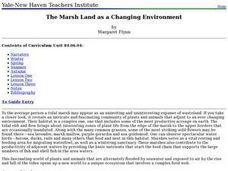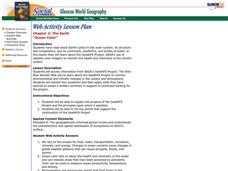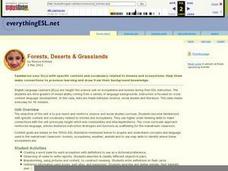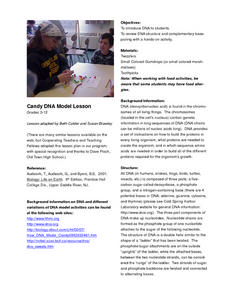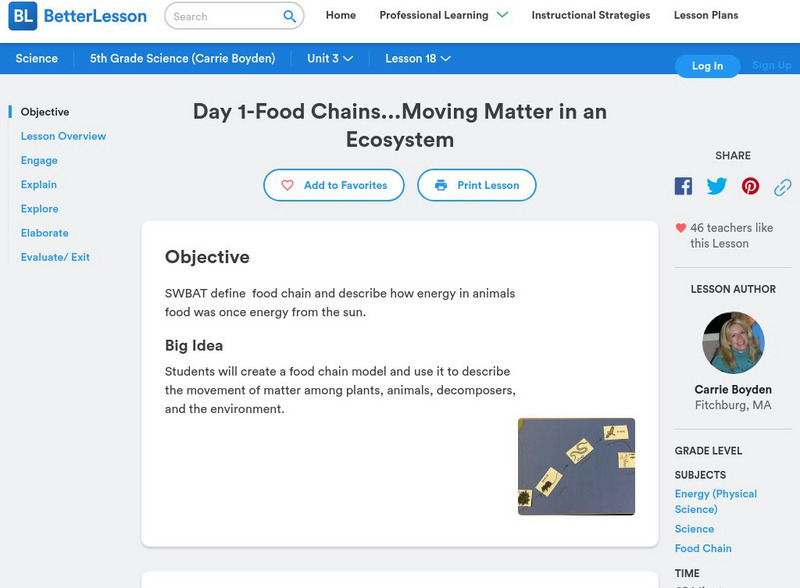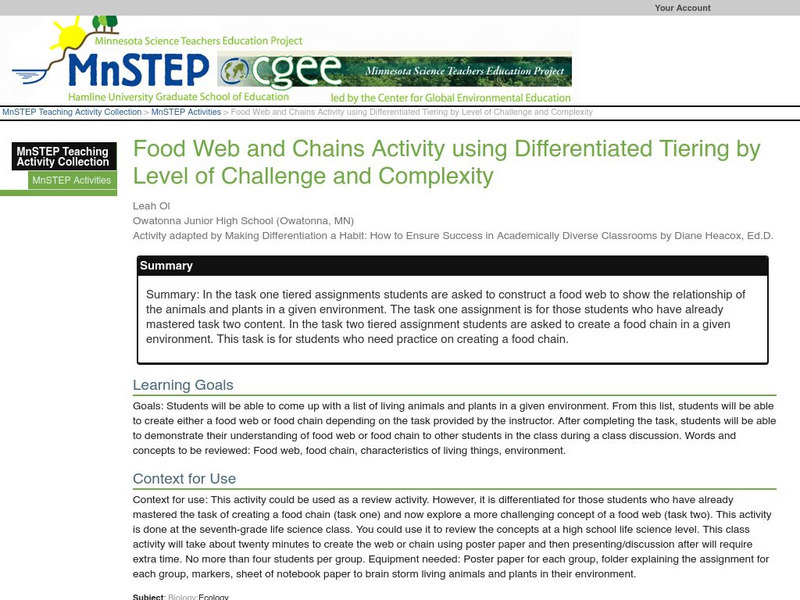Curated OER
Ecosystem In A Bottle
Ecosystem activities show how everyone and everything is interconnected. The smallest change can make a big impact.
Curated OER
The Marsh Land as a Changing Environment
Sixth graders continue their examination of the state of Connecticut. After taking a field trip, they identify the types of birds, plants, invertebrates and vertebrates who make their home in the salt marshes. In groups, they identify...
Curated OER
Penguins Nesting Know-How
Students maintain a field journal as they follow penguin parents raising their chicks during the breeding season. They formulate testable questions. Students reflect on animal behavior in the field related to survival and chick rearing.
Curated OER
What Makes up an Ecosystem?
Eighth graders design posters of working ecosystems using pictures from magazines. They label autotrophic, heterotropic, or saprotrophic energy sources, and identify predators and prey.
Curated OER
Understanding Interactions Among Local Species and the Local Environment
Students examine the differences between biotic and abiotic factors, explain the difference between habitat and niche and compare how organisms get their nutritional needs. In this local environment activity students trace the path of...
Curated OER
Ecology - Ecosystem
Third graders research ecosystems, the work of ecologists, John Muir's contribution to the environment and an endangered species of their choice. They read books, participate in discussions, and write reports.
Curated OER
Earth Day Trash Survey Unit
Students develop an action plan to prevent trash from becoming a problem in the future.
Curated OER
Ocean Color
Students examine NASA's SeaWiFS Project Web site to explore how the SeaWiFS Project monitors environmental and climatic changes in the oceans and atmosphere. They answer questions and write a summary in support of continued funding for...
Curated OER
Forests, Deserts, & Grasslands
Third graders complete activities to become familiar with the content and vocabulary related to biomes and ecosystems in order to mainstream into the classroom.
Curated OER
Candy DNA Model Lesson
Students explore DNA structure using materials such as Twizzlers, small colored gumdrops and/or toothpicks.
Better Lesson
Better Lesson: Food Chains Moving Matter in an Ecosystem (Day 1)
Students will create a food chain model and use it to describe the movement of matter among plants, animals, decomposers, and the environment. Resources include a detailed lesson plan, student handouts, pictures of a completed chain,...
National Geographic
National Geographic: Marine Food Webs
For this lesson, students learn about marine food webs and pyramids, and how energy flows through a marine ecosystem. They then research a marine organism and its role in a marine food web. The class pools their information to create a...
Other
Bigelow Laboratory for Ocean Sciences: Fitting Algae Into the Food Web
A lesson that helps students understand food chains and food webs. With the background information, interactive activity, and extensions, students will see the interconnectedness and interdependence of organisms. Activity has students...
Science Education Resource Center at Carleton College
Serc: Differentiated Tiering Food Web and Chains Activity
Two differentiated tasks about food chains and webs. In the more challenging task, students construct a food web to show the relationship of the animals and plants in a given environment. In the lower level task, students create a food...
TeachEngineering
Teach Engineering: Got Energy? Spinning a Food Web
Students learn about energy flow in food webs, including the roles of the sun, producers, consumers and decomposers in the energy cycle. They model a food web and create diagrams of food webs using their own drawings and/or images from...
Sophia Learning
Sophia: Food Webs: Lesson 1
This lesson will explain how to create a food web to show transfer of energy within a community. It is 1 of 4 in the series titled "Food Webs."
TeachEngineering
Teach Engineering: Go With the Energy Flow
Students learn about energy and nutrient flow in various biosphere climates and environments. They learn about herbivores, carnivores, omnivores, food chains and food webs, seeing the interdependence between producers, consumers and...
Annenberg Foundation
Annenberg Learner: The Habitable Planet: Ecology Lab
Create the parameters of your own ecosystem by choosing which producers and consumers live there. Visualize how the food web operates and species populations change. This simulator mimics the food web within a typical ecosystem and gives...
TeachEngineering
Teach Engineering: Biodomes
Students explore the biosphere's environments and ecosystems, learning along the way about the plants, animals, resources and natural cycles of our planet. Over the course of lessons 2-6, students use their growing understanding of...



